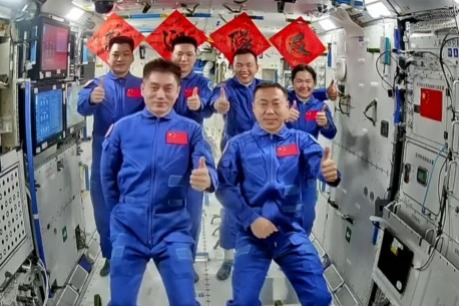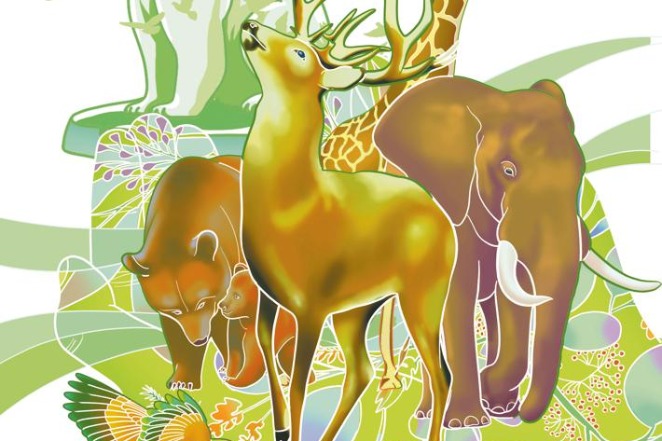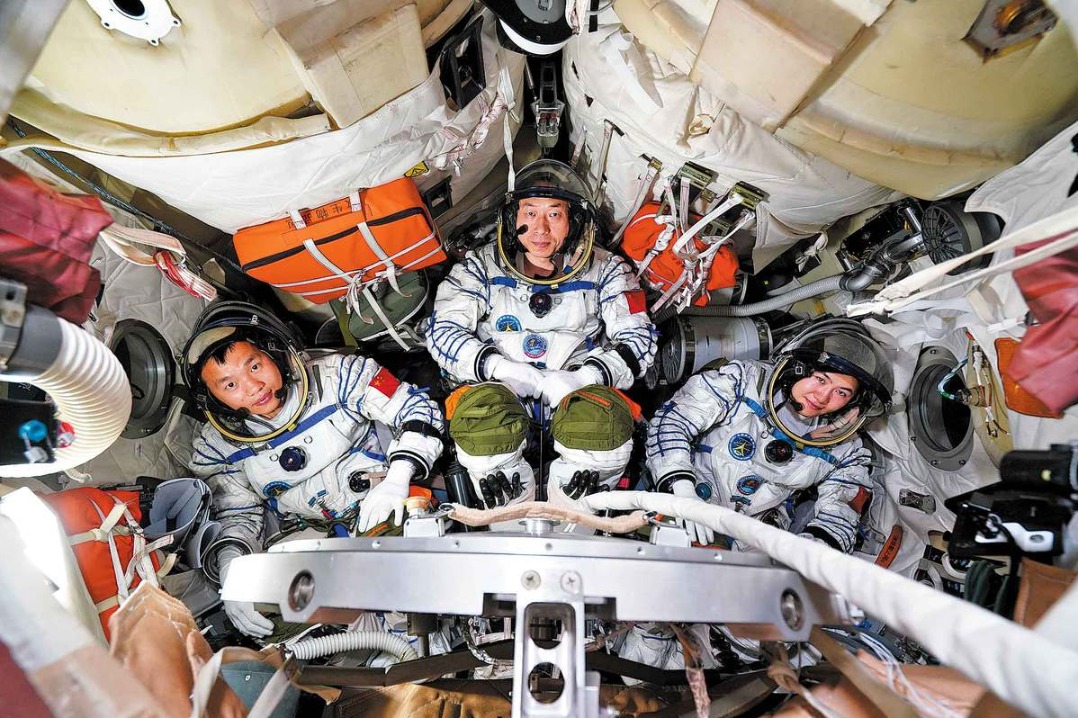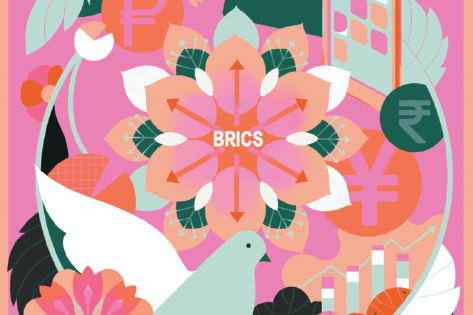When you pick up those leaves, everything picks up as well


“I feel free, loved and fulfilled.” This is how I responded to my friend when he asked me how I felt after an afternoon of hiking. To be specific, what I have done is not so much a hike as it was a gathering. I simply carried a bag with me, collected some ginkgo leaves, pine branches and cypress seeds along the road, and finally made them into a picture. As a freshman who has just set foot in this area, there is still a long way to go, but the excitement and cathartic feeling can almost reduce me to tears.
However, behind these peaceful and therapeutic moments lie some intricate plots. In the past several months, I had been living in the shadow of adversity, and that suffocating feeling drowned me like a nightmare without an end. Difficulties seeped into my life from all aspects and put me in a bind. Hard-fought work without any payoff, relentless quarrels with family over some repeating topics, and constant failures in attempts to publish a paper—all these issues threw my life into a whirlwind. In the wake of these annoying experiences, I became paranoid, and was even considered a misanthrope sometimes. I tried several ways to pull myself up, which included procrastinating on my homework, shopping online, and traveling alone. They might serve as a temporary expedient but end up worsening the case, as I still need to piece together scattered pieces. What of the side effects? The price I have to pay for those impulsive behaviors could be even more costly.
Everything came to a turning point when I was updating my moments and inadvertently noticed Lan’s latest post. Lan was my classmate in middle school and, when I first met him, I was impressed by his strong passion for art and remarkable talent in capturing details in life. Lan chose history as his major and pursued a double major in art during his undergraduate years. That interdisciplinary experience equipped him with a transcendent ability in observation and documentation.
Lan’s artwork instantly triggered my interest. After an in-depth and meaningful conversation with him, I came to realize that we all share similar experiences and confusion about life. Most importantly, he brought me inspiration in dealing with the chronic malaise that had haunted me for months. Nature can heal, and in the course of collecting those leaves, fruits and unexpected gifts from nature, you can feel its therapeutic power.
I started my interview with a simple question—what intrigued him to collect these leaves, and he responded to me with a bit of humor: “Many have proposed similar questions like this when they were passing by, and they would usually continue to ask what the use of that is. It always takes me a lot of time to organize my words and give a reasonable explanation. But chances are that my endowment or my real talent might rest in collecting things that may seem trivial to others.”
Lan told me that the gathering activity is part of his project, which aims to cultivate an ability in discovering happiness without relying on consumption. Of course, his trial was not groundless; otherwise, he acquired inspiration from reading books that have previously verified the healing power of nature in ameliorating the lives of people suffering from depression and other emotional disorders. These collections are all-natural treasures for free and, most notably, what you can find varies with the seasons and climate. They require no reliance on complex tools, no need for specialized equipment, and they are not subject to any judgment of hierarchy. You can see marks of elapsed time on them, which are irreplicable by artificial means.
The ability to gain amusement and a sense of fulfillment from picking up things from nature might be evidential. Lan’s professional background in history gives him some enlightenment about the reason, which sounded quite instructive to me. “It might be something running in our DNA that plays a part. In the early days of mankind's history, our ancestors survived by gathering, fishing and hunting. The feeling of harvesting is, to some extent, synonymous with the sense of security, and thus that pleasure is supposed to be more original and essential,” Lan said. In the course of evolution, human beings have gone through waves of selections, gradually eliminating disadvantageous features and retaining those perceived as biologically useful. The intelligence of nature is reflected by its visionary strategy, which speaks volumes about the truth that what saved our ancestors almost two million years ago might once save us again.
Confronting pressure and frustrations, the younger generation is more vulnerable to suffering from emotional disorders, for most of them are neither economically strong enough nor have the gut to start everything from scratch, and that predicament is posing a threat to them considerably. They find their own ways to entertain themselves, usually carrying it too far and things go the other way around. I used to believe endless parties and socializing can cure my inner ailment, but little did I realize, indulging myself will possibly just aggravate my symptoms and eventually take a toll. Thankfully, gathering has offered me a fresh take on what I have ignored in the past and it could be one way out of this quagmire.
Lan’s sharing was heuristic, and his strategy inspired me to imitate. As such, I made some flexible adjustments to my schedule and set aside some time for the gathering activity. It’s not as easy as it might seem at first, for not every plant will generously offer their fruits exactly when you pay a visit. But that is where the most charming part comes in, because it will push you to gain some necessary botanical knowledge to better learn the uniqueness and personality of each plant. The process itself is interesting for its resemblance to making acquaintances or new friends. The tiny exploration is a combination of physical power, observation and aesthetic ability. When the whole journey wraps up, you will feel a sense of emancipation and find solace from contacting with nature. Compared with squandering your time on mobile devices, the process of picking up something can offer you essential pleasure. The activity could be prolific, and you can find a myriad of things if you stay patient and observant, namely fruits, barks, feathers and shells.
The process of gathering enables me to admire the unfolding picture of autumn—a blend of vitality and tranquility, a mixture of fertility and emaciation, as well as a coexistence of prosperity and withering. The unfenced nature has encapsulated his words in a small palette, which interprets the pattern of life that applies to all creatures: we all have ups and downs.
I have never expected that a simple activity like this could make such a difference. It seems to me that the lives of modern people always revolve around the question of meaning, as though we would get nowhere if we couldn’t figure out the “meaning puzzle” in the first place. However, the most meaningless thing tends to be being framed by thoughts that might run counter to reality. The decision to take a step forward could be a bold one, as well as a significant one. When you pick up a pinecone, you might appreciate its subtleness and symmetry in design. When you pick up a wild persimmon, you will find it smaller than those in the market but seemingly polished with wax and more likable. When you pick up those leaves and carefully collect them in your bag, the gentle rustling seems to tell a self-fulfilling prophecy—everything will pick up as well.
The author is a college student from Sichuan, China.
The views do not necessarily reflect those of China Daily.
If you have a specific expertise, or would like to share your thought about our stories, then send us your writings at [email protected], and [email protected].


































